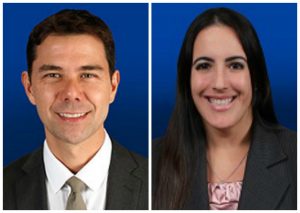Miami City Commissioner Ken Russell lost his first political battle Thursday when he failed to get  any support whatsoever on his move to terminate City Attorney Victoria Mendez after she failed to provide all the emails he asked her for about a certain Coconut Grove lot split and development.
any support whatsoever on his move to terminate City Attorney Victoria Mendez after she failed to provide all the emails he asked her for about a certain Coconut Grove lot split and development.
He didn’t even get a second to his motion.
Russell has said that Mendez, who makes $215,000 a year, intentionally withheld some of the emails he requested on the development application for a lot split on Battersea Road. She gave him 13 emails dating back to November 2015. When he requested the same email search from IT, he got 39, and the conversation started in October. The attorneys even provided the city attorney with draft language for the resolution.
“The whole 39 told a different story,” Russell said.

A drawing composite of one of the five homes to be built on Battersea
The freshman commissioner says the emails show that Mendez went above and beyond to help the developer get a positive ruling on the application to divide the property into five lots so he could build five homes. The original ruling from planning and zoning was that the application needed a document called a warrant. The emails suggest Mendez shopped it out to different attorneys on her staff until she got the decision she was looking for.
She also assured Javier Vazquez, an attorney/lobbyist for the developer with whom she is rather friendly, that she was doing all she could to resolve the issue. And one email indicates it might not have been an easy sell.
Read related story: Miami commissioner wants attorney fired for missing emails
“Javier, we’re having a hard time on this. Let’s talk next week,” she wrote on Oct. 30 last year. This was after she had told an assistant city attorney to talk to him and “see how we can figure out.”
That email was among the ones that were withheld from Russell. So was the one that had been sent by Assistant City Attorney Amanda Quirke the day before, on Oct. 29. “I spoke to Javier today. I reviewed this issue at length with planning and zoning to see if we could get to the same interpretation, but we could not,” Quirke wrote. “This is an unplatted lot that has had a house on it for more than 50 years. It is a building site, and no building site shall be diminished in the NCD  without a warrant.”
without a warrant.”
Quirke was no longer needed for meetings after that, as Vazquez indicated in an email Oct. 30 to Mendez’s assistant Marta Gomez about a meeting she was trying to reschedule for when Quirke would be back.
“My client cannot afford to keep waiting. Respectfully, we know Amanda’s opinion on the matter. We are simply wanting face to face time with Vicky to give her our interpretation,” he wrote.
Mendez chimed in: “Have Goldberg come up to speed with alternatives and we can still meet without Amanda.”
There’s more. Please press this “continue reading” button to “turn the page.”
read more
Today’s City of Miami Commission meeting is expected to get heated when Commissioner Ken Russell asks for City  Attorney Victoria Mendez to be fired for intentionally withholding documents he requested regarding the rezoning of a fast-tracked residential development in Coconut Grove.
Attorney Victoria Mendez to be fired for intentionally withholding documents he requested regarding the rezoning of a fast-tracked residential development in Coconut Grove.
And there’s likely to be some push back, specifically from members of the Cuban American Bar Association, of which Mendez, a former state prosecutor, was once president.
There’s still an independent counsel reviewing her opinion, which allowed the development to break ground, and the Miami-Dade Commission on Ethics and Public Trust is looking into the withheld emails between Mendez and the developer’s lobbyist — emails that could indicate the attorney was helping the developer get the zoning they needed, in violation of the city charter.
But Russell can’t wait for the result of those inquiries.
“Everybody is trying to make it a matter of a charter violation but it’s become more than that,” Russell told Ladra late  Wednesday. “It’s really about a working relationship and having trust in your attorney. I’ve lost that trust.”
Wednesday. “It’s really about a working relationship and having trust in your attorney. I’ve lost that trust.”
Russell had already called for Mendez to be fired earlier this month after he discovered that she had not provided him with the public records he had requested regarding the development of five single family homes on a 50,000-square-foot property the developer wants re-platted into five separate properties.
At first, the developer was told they needed a special permit, known as a warrant, to split the lot. The zoning department denied the request. The developer then sought a new opinion from the city attorney’s office — which, lo and behold, issued one saying no warrant was really needed.
“It was a minor zoning issue, but something wasn’t adding up,” Russell told me. “I thought the city attorney had issued a flawed opinion in regards to zoning. That was the beginning of the rabbit hole.”
 Mendez, who makes $215,000 a year, first tried to discourage him. There is nothing there, she told the commissioner. She herself requested the ethics investigation and has said that the emails, which she insist only show normal communications between attorneys on complicated zoning issues, were not intentionally withheld. She says Russell is simply being political for his constituency — he represents the Grove — and doesn’t like the opinion.
Mendez, who makes $215,000 a year, first tried to discourage him. There is nothing there, she told the commissioner. She herself requested the ethics investigation and has said that the emails, which she insist only show normal communications between attorneys on complicated zoning issues, were not intentionally withheld. She says Russell is simply being political for his constituency — he represents the Grove — and doesn’t like the opinion.
She was right about that last part.
“It’s such a Frankenstein of an opinion. They really did some gymnastics to be able to approve this for the developer,” he said.
So, Russell requested public documents including all the emails between the attorney’s office and the developers or their representatives. He got about a dozen. Thinking that something was still not adding up, he asked the IT department to do a search for emails using he same search criteria. This time, he got 40-something. That means there were more than two dozen emails that had not been included before, including exchanges between Mendez and attorney Javier Vazquez, the lobbyist for the developer and the city attorney’s friend.
“All the emails withheld show an entirely different story,” Russell said. “Every department issued a strong opinion as to why this was wrong. She shopped it to one attorney, but when she didn’t like that opinion it was a bad opinion. She took it to a second city attorney. Again it was a bad opinion.
“Through correspondence with the lobbyist, she says she’s working on it but she’s having a hard time,” Russell said.
That right there should be reason enough for commissioners to support Russell’s move to terminate Mendez, who became the city attorney three years ago. The withholding of public records is unacceptable in and of itself — and, from what I understand, it is a pattern with the  Miami city attorney’s office. Just ask Grant Stern (more on that later). But the fact that she went out of her way to provide a favorable opinion to a friend is a big problem. Planning and zoning didn’t seek a legal opinion from the city attorney. They didn’t need it. They are certain that a warrant is needed to split the property. Vazquez asked for her opinion. And Mendez doesn’t work for Vazquez. She works for the commissioners and, by extension, the people of Miami.
Miami city attorney’s office. Just ask Grant Stern (more on that later). But the fact that she went out of her way to provide a favorable opinion to a friend is a big problem. Planning and zoning didn’t seek a legal opinion from the city attorney. They didn’t need it. They are certain that a warrant is needed to split the property. Vazquez asked for her opinion. And Mendez doesn’t work for Vazquez. She works for the commissioners and, by extension, the people of Miami.
To add insult to injury, she told a Miami Herald reporter earlier this month that Russell, her boss, just doesn’t understand. Isn’t that a violation of attorney client privilege? I mean, couldn’t a developer use that against the commissioner — hence the city — in a court of law. “He didn’t understand so that’s why he voted against us.”
Commissioners considering her ouster Thursday ought to think about that. Because today, it’s Russell. Tomorrow, it could be you. And how many lawsuits would comments like that bring the city?
For Russell — a freshman who was elected in a grass roots wave last year to replace Marc Sarnoff in a race against the much better financed Mrs. Sarnoff — it’s gone beyond those very serious professional improprieties.
“It goes to a question of trust. I know she was withholding documents from me, documents I need as tools to do my job. To me it’s very simple, very black and white,” Russell told Ladra. “How are we going to work together after this?
“If I get voted down, it’s going to be an awkward two years.”
read more
 any support whatsoever on his move to terminate City Attorney Victoria Mendez after she failed to provide all the emails he asked her for about a certain Coconut Grove lot split and development.
any support whatsoever on his move to terminate City Attorney Victoria Mendez after she failed to provide all the emails he asked her for about a certain Coconut Grove lot split and development. without a warrant.”
without a warrant.”







